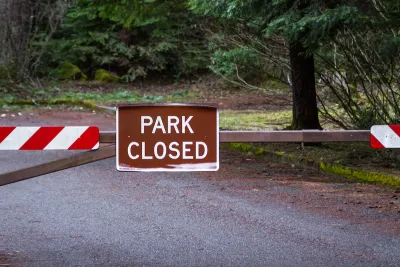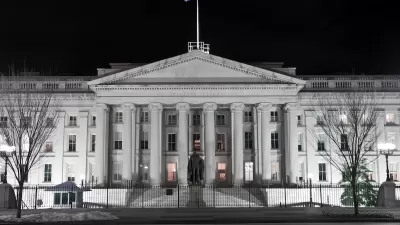Federal policy changes send shock waves through agencies at all levels of government as we continue to monitor the effects of the new administration’s slash-and-burn approach to government.

Federal funding freezes and firings continue to roil agencies that address housing, public lands, and transportation. A program that supported a nationwide EV charging network was suspended, while mass layoffs at national parks have recreation officials concerned about park safety and access during the upcoming busy season, while park-adjacent communities could stand to lose billions in tourism revenue. Planetizen blogger Todd Litman offers some advice on how to continue doing good work as a planner when politics get in the way of effective policy. And the planning world lost a beloved figure in Donald Shoup, the dynamic “parking guru” that transformed the way people think about parking and public space.
The full list of February’s most-read stories:
1. Colorado Bill Would Legalize Housing ‘In God’s Backyard’
A proposed bill would let churches and religious institutions build housing on their properties as part of a growing zoning reform movement.
2. Federal EV Charging Program Suspended
The new administration wants to end an initiative to fund a nationwide EV charging network focused on major freeways.
3. Housing Measure Wins in Seattle Special Election
Voters approved a new tax that is expected to generate roughly $50 million annually for affordable housing projects.
4. Legendary Parking Guru Donald Shoup Dies at 86
Former UCLA professor and Planetizen Courses instructor Donald Shoup helped planners understand the value of parking and curb management, always remaining a passionate advocate for walkable, livable cities.
5. Good Planning Under Bad Leadership
How can planners execute good policy under questionable regimes?
6. Analysis: Cybertruck Fatality Rate Far Exceeds That of Ford Pinto
In its short lifespan, the infamous truck has become much more deadly than one of automotive history’s most famous failures.
7. New Intercity Bus Service Will Connect Texas Cities
A charter bus company will start offering trips between Dallas-Fort Worth, Houston, and San Antonio, with plans to expand to more routes.
8. National Parks Layoffs Will Cause Communities to Lose Billions
The firing of thousands of National Park Service workers will have rippling negative effects throughout the communities that depend on them for jobs and tourism revenue.
The Trump administration’s DOT says it will tie funding to cooperation with immigration enforcement and prohibits mask or vaccine mandates.
10. Washington State E-Bike Rebate Set to Launch in April
Washington joins a growing number of states helping to offset the purchase of electric bikes, offering eligible residents rebates of up to $1,200.

Manufactured Crisis: Losing the Nation’s Largest Source of Unsubsidized Affordable Housing
Manufactured housing communities have long been an affordable housing option for millions of people living in the U.S., but that affordability is disappearing rapidly. How did we get here?

Americans May Be Stuck — But Why?
Americans are moving a lot less than they once did, and that is a problem. While Yoni Applebaum, in his highly-publicized article Stuck, gets the reasons badly wrong, it's still important to ask: why are we moving so much less than before?

Using Old Oil and Gas Wells for Green Energy Storage
Penn State researchers have found that repurposing abandoned oil and gas wells for geothermal-assisted compressed-air energy storage can boost efficiency, reduce environmental risks, and support clean energy and job transitions.

Updating LA’s Tree Rules Could Bring More Shade to Underserved Neighborhoods
A new USC study finds that relaxing Los Angeles’ outdated tree planting guidelines could significantly expand urban tree canopy and reduce shade disparities in lower-income neighborhoods, though infrastructure investments are also needed.

California's Canal Solar Projects Aim to Conserve Resources and Expand Clean Energy
California’s Project Nexus has begun generating electricity from solar panels installed over irrigation canals, with researchers and state agencies exploring statewide expansion to conserve water and boost clean energy production.

HHS Staff Cuts Gut Energy Assistance Program
The full staff of a federal program that distributes heating and cooling assistance for low-income families was laid off, jeopardizing the program’s operations.
Urban Design for Planners 1: Software Tools
This six-course series explores essential urban design concepts using open source software and equips planners with the tools they need to participate fully in the urban design process.
Planning for Universal Design
Learn the tools for implementing Universal Design in planning regulations.
Heyer Gruel & Associates PA
City of Moreno Valley
Institute for Housing and Urban Development Studies (IHS)
City of Grandview
Harvard GSD Executive Education
Salt Lake City
NYU Wagner Graduate School of Public Service
City of Cambridge, Maryland






























